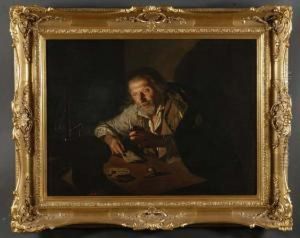Cesare Pezzi Paintings
Cesare Pezzi was an Italian painter, primarily known for his portraits and historical scenes. Born in Milan in 1822, he was part of the vibrant art scene that characterized Italy during the 19th century. Pezzi's work was influenced by the Romantic movement, which was sweeping across Europe at the time, emphasizing emotion and individualism as well as glorifying the past and nature.
Pezzi studied at the Brera Academy, one of the most prestigious art schools in Italy, where he was taught by prominent artists of the day. His education there would have provided him with a strong foundation in the techniques and traditions of fine art, which he would later apply to his own work. Throughout his career, Pezzi's paintings demonstrated a mastery of form and color, and his portraits were particularly admired for their ability to capture the personality and essence of the subject.
In addition to his portraits, Cesare Pezzi was also known for his historical paintings. These works often depicted significant moments from Italian history, imbued with a sense of drama and narrative that resonated with the patriotic spirit of the era. The 19th century was a period of significant political and social change in Italy, with the Risorgimento movement leading to the unification of the various Italian states into a single kingdom. Art played a key role in shaping the national identity, and artists like Pezzi contributed to this process through their work.
Despite his contributions to Italian art, Cesare Pezzi remains a relatively lesser-known figure outside of Italy, and his work is not as widely recognized as that of some of his contemporaries. Nevertheless, within Italy, his paintings can be found in museums and galleries, and they continue to be studied and appreciated by those interested in the art and history of the period.
Cesare Pezzi's career spanned much of the 19th century, and he continued to paint until his later years. He passed away in 1902, having lived through a dynamic period in Italian history and having left behind a body of work that captures the essence of his time.
